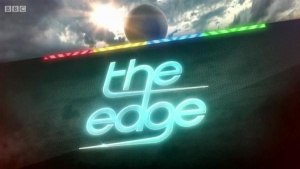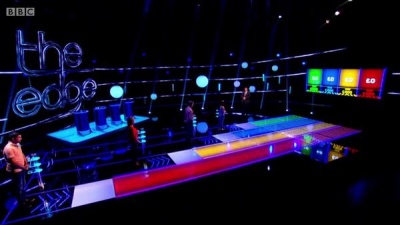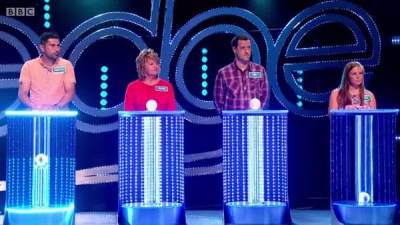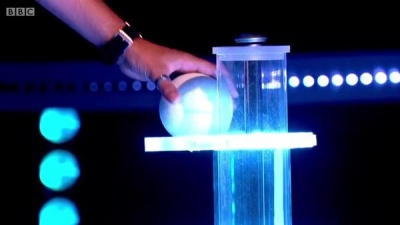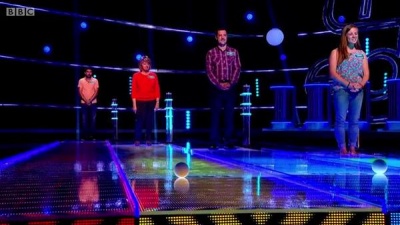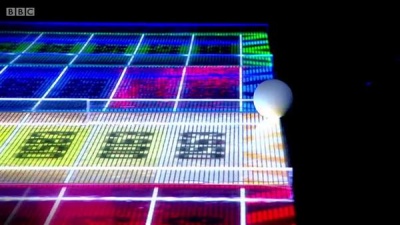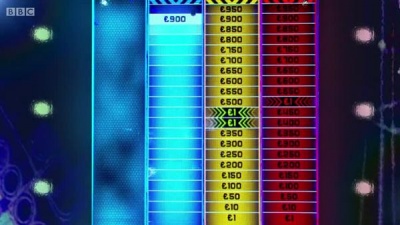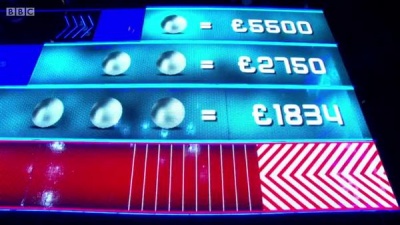The Edge
(Following a reconsideration, decided to refer to the lanes by their colours, rather than their lengths - while still making clear that the green lane was the shortest, followed by the blue lane) |
(Re-described the third round and the final, including clarifying that (for instance) deciding on two balls and landing on the Edge in one still only meant you won half of the money you had accumulated) |
||
| Line 37: | Line 37: | ||
<div class=image>[[File:The edge bowling.jpg|400px]]''Rollin', rollin', rollin'...''</div> | <div class=image>[[File:The edge bowling.jpg|400px]]''Rollin', rollin', rollin'...''</div> | ||
| - | Whoever bowls the least amount of money | + | Whoever bowls the least amount of money leaves the show with nothing. If there's a tie, there's a one-ball bowl-off, closest to the Edge without going over wins. Afterwards, the green lane is closed off for the remainder of the game. |
<div class=image>[[File:The edge ball on the edge.jpg|400px]]''Teetering and teetering.''</div> | <div class=image>[[File:The edge ball on the edge.jpg|400px]]''Teetering and teetering.''</div> | ||
| Line 43: | Line 43: | ||
The three remaining contestants face another round of buzzer questions. This time, each question has a two-part answer, with both parts required to move your ball up (stop tittering). Again, first to four correct gets the first choice of lane, the other contestants' podiums are reset, and the whole process is repeated. | The three remaining contestants face another round of buzzer questions. This time, each question has a two-part answer, with both parts required to move your ball up (stop tittering). Again, first to four correct gets the first choice of lane, the other contestants' podiums are reset, and the whole process is repeated. | ||
| - | Second time at the lanes, each contestant bowls two balls, again in order of increasing length of lane. The cash zones remain the same, but the Edge is now worth £2000. The first contestant to qualify gets a standard lane, but the second contestant must face one randomly-assigned "danger zone" - which replaces one of the cash zones with £1 - and the third contestant must face two "danger zones". Whoever bowls the lowest combined amount | + | Second time at the lanes, each contestant bowls two balls, again in order of increasing length of lane. The cash zones remain the same, but the Edge is now worth £2000. The first contestant to qualify gets a standard lane, but the second contestant must face one randomly-assigned "danger zone" - which replaces one of the cash zones with £1 - and the third contestant must face two "danger zones". Whoever bowls the lowest combined amount is off the show empty-handed (regardless of what they bowled in the first round), and the blue lane is closed off. |
<div class=image>[[File:The edge danger zones.jpg|400px|The Edge]]''[[Bob Monkhouse]] called from the grave, he wants his £1 back for his [[The $64,000 Question|$64,000 Question]].''</div> | <div class=image>[[File:The edge danger zones.jpg|400px|The Edge]]''[[Bob Monkhouse]] called from the grave, he wants his £1 back for his [[The $64,000 Question|$64,000 Question]].''</div> | ||
| - | + | The two remaining contestants face yet another round of buzzer questions, now with three-part answers. First to four not only gets to choose either the yellow or red lane, but also gets to place one "danger zone" on their opponent's lane. Each contestant bowls three balls, with the Edge now worth £3000. Whoever bowls the lower combined amount goes home penniless, the yellow lane is closed off, and the last remaining contestant goes through to the final with all the money they've accumulated. | |
| - | + | In the final, the contestant must land a ball on the red lane's Edge to win some, or all, of their money. First, they face one last round of questions, with four-part answers, lasting 75 seconds. Each question correctly answered extends the Edge by the length of two cash zones. Afterwards, the contestant must decide how many balls they want: one ball to win all their cash, two for half the amount, or three for a third. If they succeed in landing on the Edge in fewer balls than they decided on (e.g. if they decide on two and succeed in one), they win only the proportion corresponding to their decision. If all their balls fail to land on the Edge - whether coming up short or rolling off - they leave with nothing. | |
<div class=image>[[File:The edge final gamble.jpg|400px|The Edge]]''That's a lot of balls. (snort).''</div> | <div class=image>[[File:The edge final gamble.jpg|400px|The Edge]]''That's a lot of balls. (snort).''</div> | ||
Revision as of 03:09, 11 October 2019
Contents |
Host
Series 1: Mark Benton
Series 2: Gabby Logan
Broadcast
BBC One, 16 March to 13 November 2015 (50 episodes in 2 series)
Synopsis
Quiz show combining general knowledge and bowling.
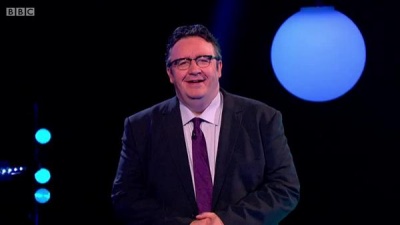 Series 1 host, Mark Benton.
Series 1 host, Mark Benton.All the action takes place on a set lit in the BBC daytime colours of black and black. On the floor are four narrow bowling lanes of different lengths - coloured green, blue, yellow and red in increasing order of length - and behind these lanes are four podiums.
At the start of the game, four contestants stand behind these podiums, each with a ball at the bottom. They're asked simple general knowledge questions on the buzzer, with a correct answer moving that contestant's ball up their podium (no laughing, now). The first contestant to give four correct answers, and thus get their ball to the top of their podium, gets to choose which of the four lanes to bowl on. The other contestant's podiums are then reset, and the whole process is repeated twice more, until the last contestant has only one lane to choose from.
Eventually, it's time to bowl. Though the lanes are of different lengths, each ends with the same series of cash zones and the titular Edge. The cash zones start at £1, followed by £10, £50, and all the increments of £50 up to £950, while the Edge is worth £1000. The lanes are separated by rails, so that balls cannot stray into neighbouring lanes. They can, however, still roll off the Edge - in which case no money is earned.
The four contestants bowl one ball each. Though they've chosen their lanes, the order in which they bowl is in increasing length of lane, with the contestant on the green lane going first. The contestant with the first choice of lane, therefore, may pick a longer lane so they know the target they're aiming for.
Whoever bowls the least amount of money leaves the show with nothing. If there's a tie, there's a one-ball bowl-off, closest to the Edge without going over wins. Afterwards, the green lane is closed off for the remainder of the game.
The three remaining contestants face another round of buzzer questions. This time, each question has a two-part answer, with both parts required to move your ball up (stop tittering). Again, first to four correct gets the first choice of lane, the other contestants' podiums are reset, and the whole process is repeated.
Second time at the lanes, each contestant bowls two balls, again in order of increasing length of lane. The cash zones remain the same, but the Edge is now worth £2000. The first contestant to qualify gets a standard lane, but the second contestant must face one randomly-assigned "danger zone" - which replaces one of the cash zones with £1 - and the third contestant must face two "danger zones". Whoever bowls the lowest combined amount is off the show empty-handed (regardless of what they bowled in the first round), and the blue lane is closed off.
The two remaining contestants face yet another round of buzzer questions, now with three-part answers. First to four not only gets to choose either the yellow or red lane, but also gets to place one "danger zone" on their opponent's lane. Each contestant bowls three balls, with the Edge now worth £3000. Whoever bowls the lower combined amount goes home penniless, the yellow lane is closed off, and the last remaining contestant goes through to the final with all the money they've accumulated.
In the final, the contestant must land a ball on the red lane's Edge to win some, or all, of their money. First, they face one last round of questions, with four-part answers, lasting 75 seconds. Each question correctly answered extends the Edge by the length of two cash zones. Afterwards, the contestant must decide how many balls they want: one ball to win all their cash, two for half the amount, or three for a third. If they succeed in landing on the Edge in fewer balls than they decided on (e.g. if they decide on two and succeed in one), they win only the proportion corresponding to their decision. If all their balls fail to land on the Edge - whether coming up short or rolling off - they leave with nothing.
Viewers had a number of problems. The "danger zones" subtracted from the spectacle, and the final used just one of many ways to make the game easier. Mostly, there was too much quiz and not enough bowling. Resetting the scores to zero smacked of padding the programme to fill a slot.
Catchphrases
"The game show with brains — and balls!"
"Let's roll!", said before every single bowl.
Inventors
Jamie Ingley and Mark Espley, developed by Leon Wilde and BBC Entertainment London team
Theme Music
Marc Sylvan is credited for "music".
Trivia
Before the recording starts, players are allowed some practice rolls, so they can gauge the strength they need to overcome friction in the playing surface.
External links
Show discussion and recording report from Bother's Bar.
See also
Quiz Bowl, a quiz show based on American football.

